TRINIDAD & TOBAGO | Trinidad and Tobago Declares State of Emergency Over Prison-Based Criminal Network

T&T Government acts on intelligence of coordinated threats against police, judicial officials emanating from within prison system
PORT OF SPAIN, Trinidad – The Government of Trinidad and Tobago has declared a State of Emergency following confirmation of a coordinated and dangerous criminal network operating from within the nation's prison system, marking the Caribbean nation's second such declaration in 2025.
The move follows a formal recommendation from Commissioner of Police Allister Guevarro, who cited credible intelligence that incarcerated individuals are leveraging internal and external connections to orchestrate attacks on senior police officers, judicial figures, personnel within the Office of the Director of Public Prosecutions, and prison officers.
The emergency declaration, which took effect on July 17, represents an escalation in Trinidad and Tobago's ongoing battle against organized crime. Unlike the previous State of Emergency that ran from December 2024 to April 2025—which targeted general gang violence—this latest measure addresses a specific and sophisticated threat emanating from within the country's correctional facilities.
Sophisticated Criminal Operations
Officials say the campaign is structured and involves multiple criminal elements working in concert, with a level of planning and execution that surpasses the capability of conventional law enforcement responses.
A key enabler of the threat has been the illegal trafficking of mobile phones into prisons by compromised insiders, allowing encrypted communications between inmates and outside operatives. This revelation highlights a significant security breach within Trinidad and Tobago's prison system, where incarcerated individuals have maintained command and control capabilities despite their confinement.
The criminal network's financial backing comes from multiple sources. The funding for these operations has reportedly come from a range of violent and organised crimes, including high-value robberies, armed home invasions, kidnapping, extortion, and the exploitation of state-funded programmes and contracts.
Immediate Response Measures
Given the severity of the threat, the State of Emergency will empower law enforcement agencies to immediately contain the situation, boost inter-agency coordination, and access the necessary resources and authority to disrupt and neutralise the criminal network. However, no curfew has been imposed at this time.
The government has moved quickly to disrupt the network's operations. A specialised Threat Response Group comprising various arms of the protective services has been established with a specific mandate to dismantle the network.
An emergency briefing was held on the night of July 17 with the Prime Minister and Attorney General, leading to the swift execution of containment measures, including the strategic relocation of high-risk inmates to disrupt command structures.
Context of Ongoing Security Challenges
This latest emergency declaration comes against the backdrop of Trinidad and Tobago's persistent struggle with violent crime. The twin-island nation of 1.5 million people ended 2024 with a record 623 homicides, prompting the previous State of Emergency that lasted 105 days.
Trinidad and Tobago already has one of the highest murder rates in the Caribbean, along with Jamaica and Haiti, according to the US Government Accountability Office (GAO), while violent deaths in the region are nearly three times the global average. In July, the US State Department set its travel advisory for Trinidad and Tobago to Level 3, advising US citizens to reconsider travel due to crime.
The country's crime challenges are compounded by its strategic location between North and South America, making it a transit point for narcotics trafficking and illegal weapons. Many of the high-powered firearms used in local crimes originate from the United States and neighboring Venezuela.
Prison System Under Scrutiny
The latest emergency has brought renewed focus to Trinidad and Tobago's prison system and its vulnerability to criminal infiltration. The Trinidad and Tobago Prison Service operates eight facilities including Port of Spain Prison, Carrera Convict Prison, Golden Grove Prison, Women's Prison, Remand Prison, Maximum Security Prison, Eastern Correctional and Rehabilitation Centre, and Tobago Convict Depot, with over 2,500 prison officers of various ranks responsible for operations.
The revelation that mobile phones were being trafficked into these facilities by "compromised insiders" suggests systemic corruption within the prison service, raising questions about staff vetting, security protocols, and oversight mechanisms.
Law Enforcement Operations Continue
Law enforcement has already begun targeted overt and covert operations which will continue until the threat is neutralised. Police Commissioner Allister Guevarro and other key officers addressed the media on July 18 to provide details on the emergency measures.
The Trinidad and Tobago Police Service has assured the public that it remains committed to protecting the country's democratic institutions and the safety of all citizens. Authorities are urging the public to remain calm, cooperate with law enforcement, and report any suspicious activity.
The State of Emergency grants expanded powers to law enforcement, including the ability to conduct searches without warrants and detain suspects for extended periods, similar to measures employed during the previous emergency period.
As Trinidad and Tobago grapples with this latest security crisis, the focus remains on dismantling the prison-based network while addressing the underlying vulnerabilities that allowed such sophisticated criminal operations to take root within the country's correctional system.
-30-
